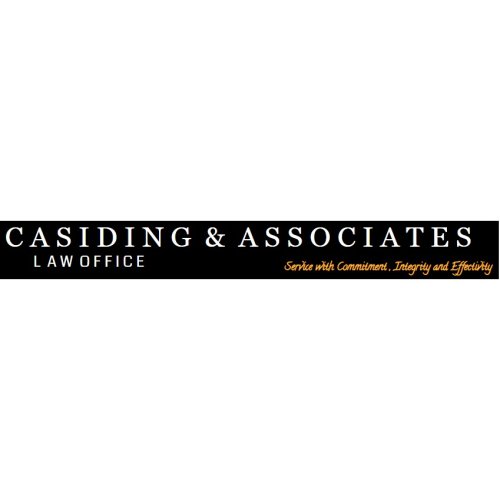Best Tax Lawyers in Philippines
Share your needs with us, get contacted by law firms.
Free. Takes 2 min.
Or refine your search by selecting a city:
List of the best lawyers in Philippines
Philippines Tax Legal Questions answered by Lawyers
Browse our 1 legal question about Tax in Philippines and read the lawyer answers, or ask your own questions for free.
- The BİR put declared purchase as net sales since there are no sales invoices of purchase. If the seller does not want to issue any copies of sales invoices, can the successful online bank transfer to sellers account signed and verified by the bank be used
- INQUIRY ABOUT NO SALES INVOICES OF PURCHASEThe BİR put declared purchase as net sales since there are no sales invoices of purchase. If the seller does not want to issue any copies of sales invoices, can the successful online bank transfer to sellers account signed and verified by the bank... Read more →
-
Lawyer answer by Afe Babalola & Co. (Emmanuel Chambers)
Yes, a successful online bank transfer to the seller's account that is signed and verified by the bank can often be used as supporting evidence to demonstrate that a purchase was made. However, whether this is acceptable depends on the...
Read full answer
About Tax Law in Philippines
The tax system in the Philippines is primarily governed by the National Internal Revenue Code (or the Tax Code), which is complemented by other laws, statutes, and regulations issued by various agencies. Taxation in the Philippines is categorized into national taxes-such as income tax, estate tax, donor's tax, value-added tax (VAT), excise tax, and documentary stamp tax-and local taxes imposed by cities or municipalities. The Bureau of Internal Revenue (BIR) is the primary agency responsible for collecting national taxes, while local government units manage the collection of local taxes.
Why You May Need a Lawyer
There are several situations where seeking legal assistance in tax matters may be necessary:
- Business Formation and Structuring: Tax lawyers can help determine the best structure for your business, ensuring compliance with tax obligations and potential tax benefits.
- Tax Disputes: If you are involved in a dispute with the BIR regarding tax assessments, liabilities, or audits, a lawyer can represent you and negotiate on your behalf.
- Tax Planning: Legal experts can advise on legal strategies to minimize tax liability in accordance with existing laws.
- Legal Interpretations: Understanding complex tax regulations and complying with continually changing laws may require professional interpretation.
- Litigation: If disputes cannot be resolved through administrative processes, a tax lawyer can represent clients in court proceedings.
Local Laws Overview
In the Philippines, several key tax-related laws include:
- Income Tax: Imposed on all income whether derived from within or outside the country. Rates vary based on residency status and corporate turnover.
- Value Added Tax (VAT): A consumption tax imposed on the sale of goods, services, and imports, typically at a rate of 12%.
- Excise Tax: Levied on specific goods manufactured or produced locally, and on selected imported goods.
- Withholding Tax Systems: Employers and payers are required to withhold and remit taxes on various payments, including salaries and professional fees.
- Estate and Donor's Tax: Placed on property transfers without valuable consideration and upon death.
Frequently Asked Questions
What are the common types of taxes I need to pay in the Philippines?
Common taxes include income tax, VAT, excise tax, and local taxes such as real property tax and community tax.
How are corporations taxed in the Philippines?
Corporations are subject to income tax based on their net taxable income in the Philippines. Rates vary, but generally, resident corporations are taxed at 25% (30% for non-resident foreign corporations).
What is the deadline for filing individual income tax returns?
Individual taxpayers must file their annual income tax return by April 15 of each year.
What happens if I fail to pay my taxes on time?
Failing to pay taxes on time may result in penalties, interest charges, or possible tax audits, which could lead to further legal action.
Are there incentives for business investments in the Philippines?
Yes, the Philippines provides several tax incentives for investments, including income tax holidays and special tax rates for certain industries.
Can I deduct expenses for tax purposes?
Businesses can usually deduct operating expenses, cost of goods sold, and other allowable deductions to reduce taxable income, provided these expenses are substantiated and necessary.
What documents do I need for tax filing?
Documents vary by tax type but may include income statements, withholding tax certificates, receipts, and financial statements.
Who is required to register with the BIR?
All businesses, self-employed individuals, and professionals must register with the BIR to obtain a Taxpayer Identification Number (TIN) and other permits.
How can a tax lawyer help in a BIR audit?
Tax lawyers can provide representation, ensure compliance with procedures, and help negotiate settlements or contest findings.
What is tax evasion and its consequences in the Philippines?
Tax evasion involves illegal practices to avoid tax liability and can lead to severe legal penalties including fines, imprisonment, and additional taxes.
Additional Resources
To gain more information or assistance on tax matters, consider the following resources:
- Bureau of Internal Revenue (BIR): The primary agency for tax collections and regulations.
- Department of Finance (DoF): Offers oversight and policy-making for tax-related matters.
- Philippine Chamber of Commerce and Industry (PCCI): Provides resources for businesses regarding taxes.
- Local Government Units (LGUs): Responsible for local taxes and can offer guidance specific to your locality.
Next Steps
If you need legal assistance in tax matters, consider these steps:
- Identify the specific areas where you need help (e.g., tax planning, disputes, compliance).
- Consult with a qualified tax lawyer or law firm with experience in Philippine tax law.
- Prepare any relevant documentation, such as income reports and previous tax returns, before your consultation.
- Discuss and understand the legal fees and payment structure with your lawyer.
- Follow through with the legal advice given to ensure compliance and address any tax issues effectively.
Lawzana helps you find the best lawyers and law firms in Philippines through a curated and pre-screened list of qualified legal professionals. Our platform offers rankings and detailed profiles of attorneys and law firms, allowing you to compare based on practice areas, including Tax, experience, and client feedback.
Each profile includes a description of the firm's areas of practice, client reviews, team members and partners, year of establishment, spoken languages, office locations, contact information, social media presence, and any published articles or resources. Most firms on our platform speak English and are experienced in both local and international legal matters.
Get a quote from top-rated law firms in Philippines — quickly, securely, and without unnecessary hassle.
Disclaimer:
The information provided on this page is for general informational purposes only and does not constitute legal advice. While we strive to ensure the accuracy and relevance of the content, legal information may change over time, and interpretations of the law can vary. You should always consult with a qualified legal professional for advice specific to your situation.
We disclaim all liability for actions taken or not taken based on the content of this page. If you believe any information is incorrect or outdated, please contact us, and we will review and update it where appropriate.
Browse tax law firms by city in Philippines
Refine your search by selecting a city.
















